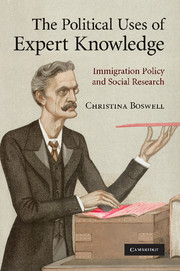Book contents
- Frontmatter
- Contents
- List of figures and tables
- Acknowledgements
- I The political functions of knowledge
- 1 The puzzle: explaining the uses of knowledge
- 2 Instrumental knowledge and organizational legitimacy
- 3 The symbolic functions of knowledge
- 4 The use of knowledge in public policy debates
- II The case of immigration policy
- III Extending the theory
- References
- Index
3 - The symbolic functions of knowledge
Published online by Cambridge University Press: 15 December 2009
- Frontmatter
- Contents
- List of figures and tables
- Acknowledgements
- I The political functions of knowledge
- 1 The puzzle: explaining the uses of knowledge
- 2 Instrumental knowledge and organizational legitimacy
- 3 The symbolic functions of knowledge
- 4 The use of knowledge in public policy debates
- II The case of immigration policy
- III Extending the theory
- References
- Index
Summary
In the previous chapter I explored the conditions under which administrative agencies use knowledge as a means of improving the quality of their output, or adjusting the societal impacts of their actions. This chapter explores the claim that expert knowledge can play two rather different types of function in policymaking. It may be valued as a means of enhancing the legitimacy of an organization or department; or as a way of lending credibility to its policy preferences. I term this way of using knowledge ‘symbolic’ in the sense that knowledge is not being valued for its content, but rather as a way of signalling the authority, validity or legitimacy of certain organizational decisions, structures or practices.
There have been a number of contributions in the literature on knowledge utilization pointing to the importance of these alternative functions of knowledge. However, as I argue in the first part of this chapter, attempts to explain the legitimizing or substantiating functions of knowledge are for the most part based on rather simplistic assumptions about organizations as power-maximizing. Such theories assume that members of organizations draw on knowledge as part of a considered and rational strategy to expand their power. Rejecting this account of organizational action, the discussion will return to the organizational institutionalist account set out in the previous chapter. This, I argue, provides a better basis for understanding how and why organizations use knowledge in these symbolic ways.
- Type
- Chapter
- Information
- The Political Uses of Expert KnowledgeImmigration Policy and Social Research, pp. 61 - 88Publisher: Cambridge University PressPrint publication year: 2009

